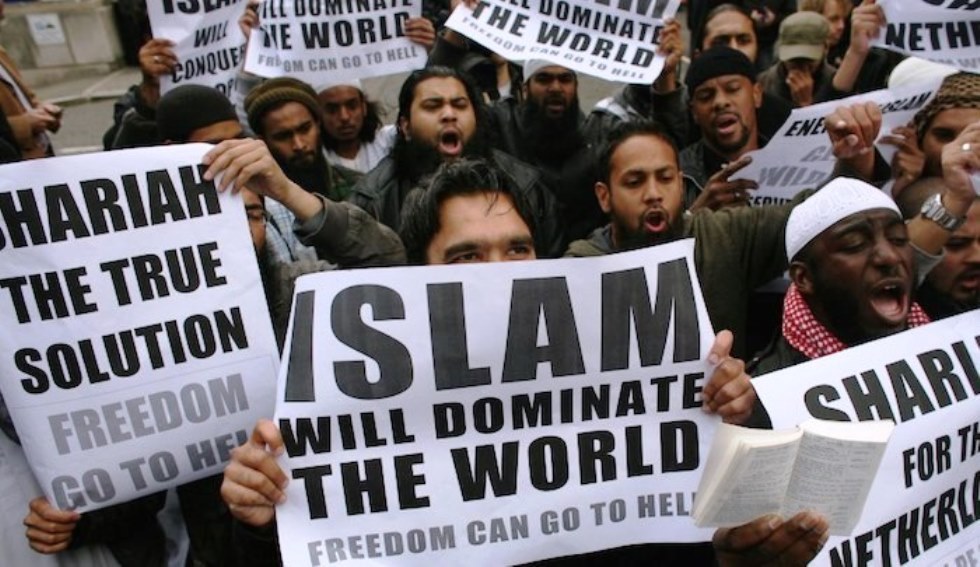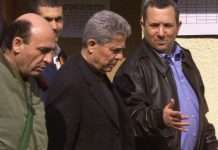A Month of Islam and Multiculturalism in Britain: June 2017
Soeren Kern/Gatestone Institute/July 28/17
Nazir Afzal, a former chief crown prosecutor and one of the most prominent Muslim lawyers in Britain, warned that an “industry” of Islamist groups in the country is undermining the fight against terrorism. He singled out the Islamist-dominated Muslim Council of Britain and also condemned “self-appointed” community leaders whose sole agenda was to present Muslims “as victims and not as those who are potentially becoming radicals.”
Col. Richard Kemp, former commander of British forces in Afghanistan, charged London Mayor Sadiq Khan with “appeasing jihadists” for authorizing the Al-Quds Day march.
More than 40 foreign jihadists have used human rights laws to remain in Britain, according to an unpublished report delayed by the Home Office.
June 3. Khuram Shazad Butt, a 27-year-old Pakistani-born British citizen, Rachid Redouane, a 30-year-old who claimed to be Libyan and Moroccan and Youssef Zaghba, a 22-year-old Moroccan-Italian, murdered eight people and injured 50 others in a jihadist attack on and around the London Bridge. The three assailants were shot dead by police. It was the third jihadist attack in Britain in as many months.
Floral tributes at London Bridge on June 6, 2017, following the 3 June 2017 terrorist attack. (Image source: Matt Brown/Wikimedia Commons)
June 3. Nazir Afzal, a former chief crown prosecutor and one of the most prominent Muslim lawyers in Britain, warned that an “industry” of Islamist groups in the country is undermining the fight against terrorism by peddling “myths” about the Prevent strategy, the government’s key anti-radicalization policy. He singled out the Islamist-dominated Muslim Council of Britain, and said he was shocked that in the agenda for its annual meeting there was “nothing about radicalisation and nothing about the threat of people going to Syria.” Afzal, who prosecuted the Rochdale sex-grooming gang, also condemned “self-appointed” community leaders whose sole agenda was to present Muslims “as victims and not as those who are potentially becoming radicals.”
June 3. Khalid Al-Mathkour, chairman of Kuwait’s sharia council, and Essam Al-Fulaij, a Kuwaiti government figure known for his anti-Semitic diatribes, are listed as trustees of a UK-registered charity that is building a mosque in Sheffield, according to the Telegraph. They have helped channel almost £500,000 ($650,000) into the project from Kuwait. Another £400,000 ($525,000) has been donated to the charity, the Emaan Trust, by a Qatari organization. The stated aim of the new mosque, which will have a capacity for 500 worshippers, is to “promote and teach Islamic morals and values to new Muslim generations.”
June 4. Prime Minister Theresa May said there was “far too much tolerance of extremism” in Britain and promised to step up the fight against Islamic terrorism after the London Bridge attack. “Enough is enough,” she said. May also claimed the jihadists held to an ideology that was a perversion of true Islam: “It is an ideology that claims our Western values of freedom, democracy and human rights are incompatible with the religion of Islam.”
June 5. Conservative election candidate Gordon Henderson said that Muslims are duty bound to report extremists in their midst:
“The only people who can defeat the Islamic terrorists are the British Muslims in whose midst they find sanctuary. It is time for peace-loving Muslims to start providing information to the police about those within their community that they suspect of plotting attacks. The only other option is to put all suspected terrorists in internment camps, and that is not a route I would like to go down. We tried it with the IRA and all it did was make the prisoners into martyrs.”
June 6. Khuram Butt, one of the London Bridge attackers, was known to British authorities, according to the Telegraph. He had appeared in a Channel 4 documentary about British extremists called “The Jihadis Next Door.” Butt was also filmed at events attended by questionable Islamic preachers, and had tried to go to Syria to become a jihadist there.
June 7. Three “Asian girls” shouting “Allah will get you” slashed a woman near a nursery in Hermon Hill, London. The victim, named as Katie, was walking along the street when she was ambushed from behind. Police said they were not treating the attack as a terrorist incident.
June 10. Conservative peer Sayeeda Warsi, the first Muslim woman to serve in a British cabinet, said that Britain’s relationship with its Muslim community needs to be reset from scratch:
“When things go wrong with an iPhone or a coffee machine, pressing the restart button is usually a good, safe place to start. Right now, Britain’s relationship with her Muslims is within that frozen, overloaded, splurging episode — we need to press the button….
“Just because you don’t speak English does not mean you’re going to be a terrorist — the majority of terrorists speak good English. Secondly, there’s always a fraction of religious groups that choose to live separate lives and that is not an issue of integration. We have to keep the issue of terrorism and integration separate.”
June 10. Police increased patrols at local mosques in Cambridge after strips of bacon were left on four cars parked at the Omar Faruque Mosque. A 19-year-old man was arrested and charged with religiously aggravated criminal damage.
June 11. Commissioner of the Metropolitan Police Cressida Dick said that jihadists do not discriminate between Muslims and non-Muslims in their attacks:
“An attack in London is an attack on all of us. I understand Muslim communities are feeling shattered and there are concerns within the community that it may find itself as a target of hate crimes.
“What I will say to the Muslim communities is that we must all stand up in the face of terrorists. The London Metropolitan Police are here to work with Muslims, to protect them and to work with them to stop crimes. If you are a target, we will work hard to protect you.”
June 13. Mak Chishty, who recently retired as the most senior Muslim police officer in Britain, said it was time for Muslims to stop “skirting around the issues” and have some “very difficult conversations.” He issued a “call to action” to all British Muslims, urging them to launch a social media blitz to let the rest of the country know how strongly they feel about extremism:
“I would like to issue a call for action today for every single Muslim, from a young person all the way through to my mother-in-law who is well in her mid-60s but has got a WhatsApp or a Facebook, to get on there and start to denounce extremism as not theirs.
“All of a sudden, maybe you will find that these extremist voices start to shrink… remove their dominance, starve them of oxygen. Make sure they have got a powerful lobby against them. We can do that now, we can do that today.”
Chishty also said that terrorism and extremism is “hurting” Islam:
“It is the Islamic duty of every Muslim to be loyal to the country in which they live and we are now asking questions to understand how extremism and hatred has taken hold within some elements of our own communities. Muslims must do more to stop such attacks from happening again and we want to know how we can play a greater role in the future.”
June 13. Lugman Aslam, 26, was sentenced to five years in prison for plowing his van into five men in Leicester after an argument during Ramadan. Aslam admitted to dangerous driving and attempting to inflict intentional grievous bodily harm. Recorder Justin Wigoder said:
“You quite deliberately drove your van at that group who were walking along the pavement. I’ve seen it on CCTV and you deliberately mounted the pavement and drove straight at them and right through the middle of them at speed…. I accept it was completely out of character. You’re of very positive good previous character and I’ve received a considerable number of references setting out all the good that is in you. You’re a good family man with a young daughter and I take that very much into account.”
June 14. Shamim Ahmed, a 24-year-old Bangladeshi from Tower Hamlets, East London, was sentenced to six years in prison for trying to join the Islamic State in Syria. During his trial, Ahmed pointed his finger at Judge John Bevan QC and warned him he, Ahmed, would continue to “wage jihad”: “Give me 20 years, I will come out the enemy.”
June 15. New statistics showed that in the year to March 2017, police arrested 304 people for terrorism-related offenses — a 20% increase compared to the previous 12 months. Combined with those held since March, the total arrests in 2017 may top the previous record of 315, set in 2015.
June 18. Hundreds of anti-Israel protesters carrying Hezbollah flags marched through the streets of London to mark Al-Quds Day (Jerusalem Day), an annual event initiated by the Islamic Republic of Iran in 1979, ostensibly to support the Palestinians, but undoubtedly to promote hatred of Jews. At a rally outside the U.S. Embassy after the march, one speaker blamed the fire at London’s Grenfell Tower public housing project on so-called Zionists. “Some of the biggest supporters of the Conservative Party are Zionists,” the speaker ranted. “They are responsible for the murder of the people in Grenfell. The Zionist supporters of the Tory Party.” Col. Richard Kemp, former commander of British forces in Afghanistan, charged London Mayor Sadiq Khan with “appeasing jihadists” for authorizing the march.
June 19. Darren Osborne, a 47-year-old unemployed father of four, drove a van into a group of worshippers close to the Finsbury Park Mosque in North London. One person was killed and eight others were injured in the attack, which police said was premeditated. Osborne was “self-radicalized into his extremist hatred of Muslims,” according to the Guardian.
June 20. Armed police were deployed to the Neolithic Stonehenge to protect thousands of pagans celebrating the summer solstice from jihadist attacks. David Spofforth of the Pagan Federation said it was “very sad” that armed police were necessary: “I am not saying I am welcoming this, I sadly accept it. But you just have to look at the events such as at Finsbury Park, a peaceful religious gathering where people suffered so much by the actions of one hate-filled individual.”
June 22. A Muslim woman sued her former employers after allegedly being ordered to remove her black headscarf because the garment had “terrorist affiliations.” The estate agent had been working for Harvey Dean in Bury for almost a year when she says managers took issue with her hijab. A complaint filed at the Manchester Employment Tribunal said the woman was told that moving from a back office into public view meant “that it would be in the best interest of the business for her to change the color of her hijab, due to the supposed terrorist affiliation with the color black.” The woman said she felt “singled out” as the only Muslim woman in the office and claimed the company discriminated against her on the basis of both religion and gender.
June 23. Amanda Spielman, the head of Ofsted, the schools regulator, vowed to crack down on Islamic extremism in British schools. She said that school children must be equipped with the “knowledge and resilience” required to combat the violent rhetoric “peddled” by hate preachers who “put hatred in their hearts and poison in their minds.” She added:
“One area where there is room to improve is the active promotion of fundamental British values in our schools. Recent attacks in Westminster, London Bridge, Manchester and Finsbury Park have brought into stark relief the threats that we face.”
June 24. More than 40 foreign jihadists have used human rights laws to remain in Britain, according to an unpublished report delayed by the Home Office. The study, a copy of which was leaked to the Telegraph, describes how lawyers, funded by legal aid, have successfully prevented foreign-born terror suspects from being sent back to their home countries.
June 25. Michael Adebolajo, who together with Michael Adebowale murdered British soldier Lee Rigby outside Woolwich barracks in south-east London in May 2013, is now regarded as the most dangerous prisoner in the British penal system, according to prison sources. A prison officer described him as “violent, unpredictable and a major danger to other prisoners.” He has also radicalized dozens of inmates, including non-Muslim prisoners who are said to have converted to Islam and sworn allegiance to the Islamic State. One prison official said:
“Adebolajo spends most of his waking hours preaching his distorted form of Islam to anyone who will listen. He sees every inmate as a potential Islamic State soldier whether they are Muslims or not. He has a big personality and is very charismatic and some of the more vulnerable prisoners will fall under his spell. He is a very dangerous individual.”
June 27. Muslims launched an online petition to oppose a new veil policy at John Thursby Community College, in Burnley, Lancashire. The school announced plans for a universal-length headscarf that some Muslims said is too short and not sufficiently modest. Previously girls were free to choose any length they pleased. Some feel that the move is aimed at deterring girls from wearing headscarves at all. Local councilor Shah Hussain said: “The whole point is that it is supposed to protect the wearer’s modesty, and that does not happen.” The school’s head teacher David Burton said he may reconsider the policy. “We are sorry there have been suggestions that the school is against headscarves. This is not true. We fully respect the wishes of girls to wear a headscarf.”
June 28. The trial began in London of four jihadists — Naweed Ali, 29, Tahir Aziz, 38, Khobaib Hussain, 25, and Mohibur Rahman, 32 — for allegedly plotting a knife rampage on British soil. The men, who called themselves “The Musketeers,” were accused of sharing “the same radical belief in violent jihad.” Prosecutors said the terror plot involved a samurai sword and a meat cleaver with the word “Kafir” (unbeliever) scratched onto the blade. The four men were arrested after a stash of weapons, ammunition, and a pipe bomb were found in Ali’s car during a counter-terrorism operation in Birmingham.
June 29. Three men were arrested in the Armagh and Coalisland areas of Northern Ireland for displaying anti-Muslim posters and stickers. Police said the material — which included the slogan “Rapefugees Not Welcome” — was likely to stir up “racial hatred.”
June 30. Tarik Chadlioui, a 43-year-old Moroccan cleric living in Birmingham with his wife and eight children, was accused of recruiting jihadists for the Islamic State. Chadlioui, a Salafist, is wanted in several European countries and is believed to be the spiritual leader of an Islamic State cell in Spain. Chadlioui, also known as Tarik Ibn Ali, is said to have formed links with jihadist groups which aim to impose Sharia law in Europe.
*Soeren Kern is a Senior Fellow at the New York-based Gatestone Institute.
© 2017 Gatestone Institute. All rights reserved. The articles printed here do not necessarily reflect the views of the Editors or of Gatestone Institute. No part of the Gatestone website or any of its contents may be reproduced, copied or modified, without the prior written consent of Gatestone Institute.
https://www.gatestoneinstitute.org/10742/islam-multiculturalism-britain-june





















